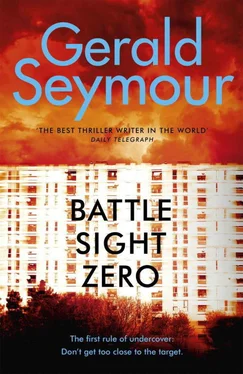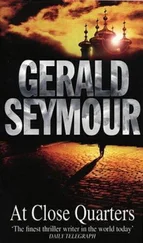‘It is about security.’
‘Yes.’
‘You understand what is the alternative to security?’
‘Always I am careful.’
‘The alternative?’
‘To be arrested.’
‘It is not, Zeinab, just to be arrested. It is to sit in a prison cell for ten years or twenty years. I assume the boredom of it is suffocating. You achieve nothing, make nothing change. To be arrested is to have failed, and you are arrested because you have ignored security. Or, Zeinab, you may be dead. If they arrest you, or me, or… They will come with guns. They would like to kill you. Who complains if they shoot you? No one complains. Perhaps it is better to be killed than to exist in a cell. If you attack them and are shot then they have to buy your life dearly and the cause is served. If they shoot you when they arrest you, and say your hand went to a pocket and they feared for their lives, then everything about you is wasted. It matters to us, Zeinab, security. Always you must have suspicion.’
‘Yes.’
They hit an outer road, left the city.
Karym watched.
The kid was brought for the barbecue.
A car had been chosen, an old Citroen, with bald tyres and scrapes on the paintwork. The car was owned by a man whose eyesight was failing and who had been told by the clinic that he should no longer drive. The car was in a convenient place, not too near any occupied building. The car was not chosen because it was spare to the old man’s needs, but because it suited.
Karym had no role in the barbecue. He had seen several. The first he had witnessed had been when he was fourteen years old. He remembered it clearly: a barbecue in any of the projects was not quickly forgotten, lessons were usually well learned. His brother had organised it as a response to an infringement of discipline. The smell had lingered in Karym’s clothes for days. He understood. Everyone in the project understood that discipline was integral in any project, would be enforced. The kid might have thought that he was to be brought out for a public beating, perhaps with an iron angle bar, perhaps with a baseball bat or pickaxe handle. Or he might have thought, possibly hoped, that he was being taken to an area of wasteland to be thrown down among the shit and the weeds and then a pistol fired into his kneecap which would mean hospital for a month and a limp for a lifetime. If he were lucky, Karym thought, then he would not have considered the prospect of a barbecue awaiting him. It was a refinement of his brother that Hamid, himself, did not bring the kid from the building where he had been held most of the night. The job was given to the kid’s associates. In La Castellane loyalties switched fast.
Karym imagined the kid’s mother sitting on a chair in her kitchen waiting for news of her son and hoping that she would learn before first light of a beating or a pistol shot and hear the cry of an ambulance siren; she would not have considered calling the police, not earlier and not now. With the night’s trade over and the project quiet, there was little movement except for the flitting shadows that skirted the buildings, hugged the walls, barely visible, and the kid was led towards the Citroen. A progression made in silence, and the kid cooperated and did not scream and did not fight, did not resist, and might still have hoped. The bad moment would have been when the little procession came to the last corner to be rounded before reaching the car. Quickly, and with expert efficiency by a youth who hoped to take a favoured position in the organisation of Karym’s brother, a tightly folded cloth was hooked up over the kid’s head, allowed to fall below his nose, pulled taut and past the kid’s teeth and into his mouth, gagging him. Round the corner, where the wind buffeted the alleyways of the project, would be the vomit-making stench of spilled gasoline. Now the kid reacted. No baseball bat, no pickaxe handle, no pistol noisily cocked, but the stink of the slopped fuel. A crowd was there – not the old people, but some of the younger women who would have put off their bedtime to come out for the show. They were the ones who knew the colour of the balaclava worn by the policeman who had the name of the executioner of more than two centuries before, and they had elbowed their way to vantage-points, had a clear view. Most of the watchers, joined now by Karym, were the teenagers who had no work other than in the evenings when they supervised aspects of the hashish trade. The smell of the gasoline would have been in the kid’s nose.
Closer to the car he began to struggle. Karym’s brother was there, at the back, showing no authority, no emotion, and claiming no involvement. It was the life of the project.
Arms trussed behind his back, legs tied at the ankles. A rear door opened. Thrown inside. The window open. He would have fallen on to a seat soaked with fuel. Tried to scream and could not; tried to kick open the door and could not. The kid would have heard the click of a cigarette lighter, would have seen the flame catch at the rag held over the flame, seen it carried close. Then the kid would have cowered as the rag was tossed casually through the window. Unable to shriek, his voice a gurgle, and no one helped him, but many watched.
The car exploded in flames and that was the moment a barbecue, Marseille-style, was lit… It was serious punishment but so also was the flaunting of a firearm and the breaking of discipline. Few, at that time, were asleep in La Castellane and the blaze climbed and the acrid smoke soared towards upper windows. When they could no longer see the kid, and his death throes, the crowd dispersed as if reluctant to accept it was finished.
Many slept, not heavily, and some were fortified with alcohol, which dulled awareness, and some were uneasy: none knew what was called the sleep of the good.
In the arms of Marie, her brightly painted nails playing patterns on his back, Tooth snored: he was exhausted from the physicality of their bed play, and had felt slight chest pains but had carried on because he never – from anything – backed off.
Undressed to his underwear and with his wife long gone to bed, the DIGN marksman, Samson, snored in a chair. The television had shown a film of elephant seals in some distant continent, and now displayed a meaningless snowstorm. He loved the world of the wild, its violence and simplicity. In a few hours an alarm would wake him and his wife in the apartment off the Rue Charras in the 7th arrondissement but until then he would sleep deeply, untroubled by conscience pangs.
And the Major – the response that he would make to the English visitors forgotten, expecting him to jump and liable to disappointment – was in his bed, his wife’s back against him, and the difficulties of the projects were banished, but his sleep was restless.
Hamid slept. Had not wanted the attention of his mistress, had left the couch for her. He wheezed from phlegm on his chest – he had smoked too often that day – but sleep took him, aided by a dosage of quality whisky. The sights of the evening did not register, he never dreamed, and sleep was a black void for him.
And far away, in the better suburbs of the Manchester area, with the tickets for his flight in the pouch on the dining-room table, and his bag packed, Crab slept. Even the excitement and pleasure of taking up arms again – in a way – or going back to war, being with a comrade and imagining combat, could not stifle his rhythmic grunting.
Pegs slept in the bedroom of the shoebox apartment they rented in the Vauxhall area and close enough to Wyvill Road. But Gough paced and smoked in the living-room, would feel worse than death in the morning, had a surveillance operation – two vehicles – running, and on a table was his mobile… He knew the target had left Manchester, knew the tail was in place. The stress factor always built when a Tango was tracked, when the pace quickened… but, if the tail maintained contact and the phone did not ring he would hope to sleep in the chair, not disturb Pegs, get a trifle of rest before the start of another day.
Читать дальше












